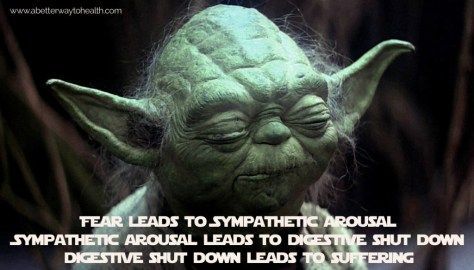How Your Thoughts Affect Your Digestion

Highlights
- Digestion begins in your brain when you think about food, before you even start eating
- Stomach acid secretion, release of digestive enzymes, and proper movement of food through the digestive tract all rely on this system to work properly
- This first phase of digestion, called the cephalic phase, only works properly when you are relaxed and paying attention to what you are eating. Stress shuts down digestion.
- Relaxing and being mindful while eating is a really effective (and free) way to boost your digestion
You would probably wash a dirtly plate before eating off of it and you probably don’t serve a hot meal before you’re sure that it’s been cooked to your satisfaction. There are certain bits of preparation that you always take care of before eating. But how often do you make sure that you’re mentally prepared for the food that’s about to pass your lips? And how important is it anyways?
We often think about digestion as beginning in the mouth, with chewing and the mixing of food with saliva, and that certainly is the first mechanical bit. But digestion actually begins in the brain, in something called the “cephalic phase” of digestion (“cephalic” means “relating to the head”). The cephalic phase of digestion begins when we see, smell or even just think about food.
Digestion Starts in Your Brain

This concept was first described by Ivan Pavlov, who demonstrated that his dogs would start salivating at the anticipation of a meal1. In other words, they were having a physiological digestive response due to thoughts alone. Since then, the list of physical digestive responses that have been shown to be turned on or enhanced as a a direct result of the cephalic phase of digestion, which all happens before food even hits our stomach, continues to grow steadily.
| Thought stimulated response | Organ(s) | Function(s) |
|---|---|---|
| Salivation | Mouth | Lubricate food, begin digestion of starch, kill some bacteria |
| Stomach acid secretion | Stomach | Breakdown of food |
| Gastrin | Stomach | Stimulates stomach acid secretion |
| Lipase | Stomach; pancrease | Digests fats |
| Gastric emptying | Stomach | Regulates food passage |
| Intestinal motility | Intestine | Regulates food passage |
| Bicarbonate | Intestine | Neutralizes stomach acid |
| Cholycystokinin | Small intestine | Breaks down fat and protein |
| Insulin | Pancrease | Regulates blood sugar |
| Pancreatic polypetide | Pancreas | Regulates pancreatic secretions |
| Digestive enzymes | Pancreas | Digestion of protein, carbohydrates and fat |
| Bile | Gall bladder | Prepares fat for digestion |
| Leptin | Adipose tissue; stomach | Reduces appetite |
| Ghrelin | Stomach | Stimulates appetite, growth hormone, fat absoption2 |
I’d like you to pause for a sec and just consider this list. The digestion of fats, sugars, and proteins, the proper movement of your stomach and intestines, as well as hormonal control of your appetite all start before your fork even stabs that first spear of asparagus.
Hormones and enzymes controlling all of the central aspects of digestion and absorption are directly affected by our mindset before and while we are eating. And the impact is significant. Over 15% of pancreatic enzyme secretion3 and over 50% of many gut peptides4 (like cholecystokinin, somatostatin, and neurotensin) are released just by thinking about lunch.
So how does it work?
(I’m going to go into a little bit of anatomy and physiology here, which you may find interesting. If it’s not your cup of tea, feel free to skip ahead to how you can improve your digestion through giving this system a tune up.)
First, it’s helpful to have a little bit of an understanding of how our brain controls our body. There’s a part of the nervous system called the “autonomic nervous system” (I always think of it as the “automatic” nervous system – the part that works without us thinking about it, like our heart beating). The autonomic nervous system has two main parts – the “sympathetic” part, which we think of as our “fight or flight” response and the “parasympathetic” part, which is responsible for “resting and digesting.”
Mmmmm, steak
When we see, smell, taste or even think about food, we stimulate a part of the brain called the cerebral cortex, which is the outermost bit. This sends a message to the hypothalamus, a part of the brain that connects the nervous system (our brain and nerves) to the endocrine system (our hormones and the glands that produce them). From here, the parasympathetic nervous system is stimulated and digestive preparation magic happens, all initiationed by your thoughts. It’s a bit like being a digestive Jedi.
Sounds good, so what’s your point?
What I’ve just described to you is what happens when we take time to anticipate what we’re going to eat and use all of our senses to notice the texture, taste and smell of our food. In other words, our digestive function is turbocharged when we take time and attention to fully enjoy our food. But when we mindlessly shovel a take away into our passively accepting gob while watching re-runs, this doesn’t happen so much.
And what happens when we eat when we’re under stress?
Remember how I described how a thought or sensation to do with food activates our parasympathetic “rest and digest” pathway to get those digestive juices flowing? Well if we’re eating while we’re working, stuck in traffic, arguing or fretting about our bills, in other words, when we’re having strressful thoughts, the cerebral cortex tells the hypothalamus to activate the sympathetic nervous system, which cranks up the fight or flight response. So, not only do we not crank up these crucial juices and enzymes, but we actually divert blood flow away from our digestive organs and towards our arms and legs so we can run away from the proverbial tiger. That’s a recipe for a tummy ache.

Can changing your thoughts and reducing stress really improve your digestion?
There’s actually some really good evidence to suggest that the answer to this question is “yes.” According to the most recent Cochrane Review (which is considered to be a reliable analysis of research evidence), hypnotherapy, an intervention that changes the way we think through the use of suggestions, has consistently been shown to be effective in treating irritable bowel syndrome (IBS) 5. IBS is basically a collection of symptoms that arises from impaired digestive function.
Likewise, another recent Cochrane Review found that acupuncture is more effective than anti-spasmodic drugs in treating IBS6. There are many possible mechanisms for acupuncture’s effectiveness for treating the symptoms of IBS, but modulation of the vagus nerve – in other words, getting the parasympathetic “rest and digest” nervous system to work better – is thought to be a big part of it.7
Take Action
So what can you do? First, evaluate your current eating habits and perhaps make notes about them for a few days using a journal. Answer the following questions:
- What was I doing right before I ate?
- Was I doing anything while eating?
- How long did I give myself to eat?
- How did I feel emotionally? Was I stressed? Or was I relaxed?
- Did I enjoy the meal? Or did I eat on autopilot without paying attention?
- How did my digestion feel? Did I feel comfortable after I ate? Or did I feel bloated, windy, gassy or nauseaus?
Based on your answers to these questions, you can get a sense of where there’s room for improvement in this department and things you may be able to easily change to enjoy your food more and in turn, digest it and absorb it better.
Doing a Mindfulness Eating Exercise is a great way to become more aware of our food while eating while ramping up your digestive prowess.
Other ideas
- Build more time for eating into your schedule. If you normally grab a sandwich from the local shop near work, perhaps you can bring something with you that you made at home. This will save some time from your lunch break so you’ll have more time for eating and enjoying.
- Eat in places that you find relaxing and move away from places, like your desk, that you associate with work and stress.
- Muster up some gratitude before digging in – this does not have to be religious and does not have to be voiced out loud. I started doing this about a year ago (I’m pretty sure my friends and family haven’t noticed me doing it) and I find that I enjoy my food sooooo much more for doing it, not to mention the positive effects it must be having on my gastric and pancreatic secretions!
Parting Thoughts
Digestive problems are ridiculously common these days8, as the sales of over the counter medicines and data on doctor’s visits attests. If you’re reading this article, you are probably looking for a better approach to fixing or improving your digestion or you know someone else who is, one that doesn’t just mask symptoms but gets to the root of the problem.
The underlying causes of impaired digestion are individual. But the great thing about improving your eating rituals is that no matter what your individual problem or problems are, being more present and positive while eating will improve digestive function as a whole and improve the success of any other efforts you make.
So here is my sincerest advice: before you supplement with enzymes and hydrochloric acid, try to get better at making these yourself. Take a look at your eating ritual and see if there are improvements to be made. Not only will you immediately improve your digestive function but you will enjoy eating more. And enjoying things more is good. And best of all, it’s free.
photo credit: {platinum}
1 Power ML, Schulkin J. Anticipatory physiological regulation in feeding biology: cephalic phase responses. Appetite. 2008 Mar;50(2-3):194–206.
2 Power ML, Schulkin J. Anticipatory physiological regulation in feeding biology: cephalic phase responses. Appetite. 2008 Mar;50(2-3):194–206.
3 Buss C, Kraemer-Aguiar LG, Maranhão PA, Marinho C, Graças C de Souza das M, Wiernsperger N, et al. Physiology & Behavior. Physiology & Behavior. Elsevier Inc; 2010 Mar 18;105(4):1082–7
4 Liska D. Clinical Nutrition. The Institute for Functional Medicine; 2004.
5 Webb AN, Kukuruzovic RH, Catto-Smith AG, Sawyer SM. Hypnotherapy for treatment of irritable bowel syndrome. Cochrane Database Syst Rev. 2007;(4):CD005110
6 Manheimer E, Cheng K, Wieland LS, Min LS, Shen X, Berman BM, et al. Acupuncture for treatment of irritable bowel syndrome. Cochrane Database Syst Rev. Wiley Online Library; 2012;5
7 Huang S-T, Chen G-Y, Lo H-M, Lin J-G, Lee Y-S, Kuo C-D. Increase in the vagal modulation by acupuncture at neiguan point in the healthy subjects. Am J Chin Med. 2005;33(1):157–64
8 Spiller R, Aziz Q, Creed F, Emmanuel A, Houghton L, Hungin P, et al. Guidelines on the irritable bowel syndrome: mechanisms and practical management. Gut. 2007 Dec 1;56(12):1770–98

